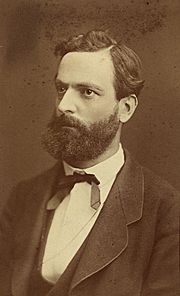Heinrich Martin Weber facts for kids
Quick facts for kids
Heinrich Martin Weber
|
|
|---|---|
 |
|
| Born | 5 March 1842 |
| Died | 17 May 1913 (aged 71) |
| Nationality | German |
| Alma mater | University of Erlangen University of Heidelberg |
| Known for | Abstract algebra Number theory |
| Scientific career | |
| Fields | Mathematics |
| Doctoral advisor | Otto Hesse |
Heinrich Martin Weber (born March 5, 1842, in Heidelberg, Germany – died May 17, 1913, in Strasbourg, France) was an important German mathematician. He is known for his work in different areas of mathematics. These areas include algebra, number theory, and analysis.
Weber wrote a famous textbook called Lehrbuch der Algebra in 1895. This book included a lot of his own new ideas and research. He also worked with another mathematician, Richard Dedekind, on algebraic functions. This work helped set up new ways to understand complex mathematical ideas. Weber published many research papers in well-known math journals. He also helped edit the collected works of another famous mathematician, Bernhard Riemann.
Early Life and Education
Heinrich Martin Weber was born in Heidelberg, which was then part of the Grand Duchy of Baden. He started studying at the University of Heidelberg in 1860. After finishing his studies, he became a "privatdozent" in 1866. This meant he could teach at the university. In 1869, he became an extraordinary professor at the same university.
Teaching Career
Weber taught at several different universities during his career. He taught in Zurich at the Federal Polytechnic Institute, which is now known as ETH Zurich. He also taught at the University of Königsberg and the Technische Hochschule in Charlottenburg. His last teaching job was at the Kaiser-Wilhelm-Universität Straßburg. This university was in Alsace-Lorraine, where he passed away.
Contributions to Mathematics
Heinrich Martin Weber made many important contributions to the field of mathematics. He was especially known for his work in algebra and number theory. These are branches of mathematics that deal with rules and properties of numbers and mathematical structures.
In 1893, one of his papers was presented at a big international math meeting in Chicago. This meeting was part of the World's Columbian Exposition. Weber also served as the president of the Deutsche Mathematiker-Vereinigung (German Mathematical Society) twice, in 1895 and 1904. He also guided several students who went on to become important mathematicians themselves. Some of his doctoral students included Heinrich Brandt and Friedrich Wilhelm Levi.
See also
 In Spanish: Heinrich Martin Weber para niños
In Spanish: Heinrich Martin Weber para niños
- Kronecker–Weber theorem
- Weber's theorem (Algebraic curves)
- Weber's modular function
- Weber function
- Weber vector
 | Anna J. Cooper |
 | Mary McLeod Bethune |
 | Lillie Mae Bradford |

